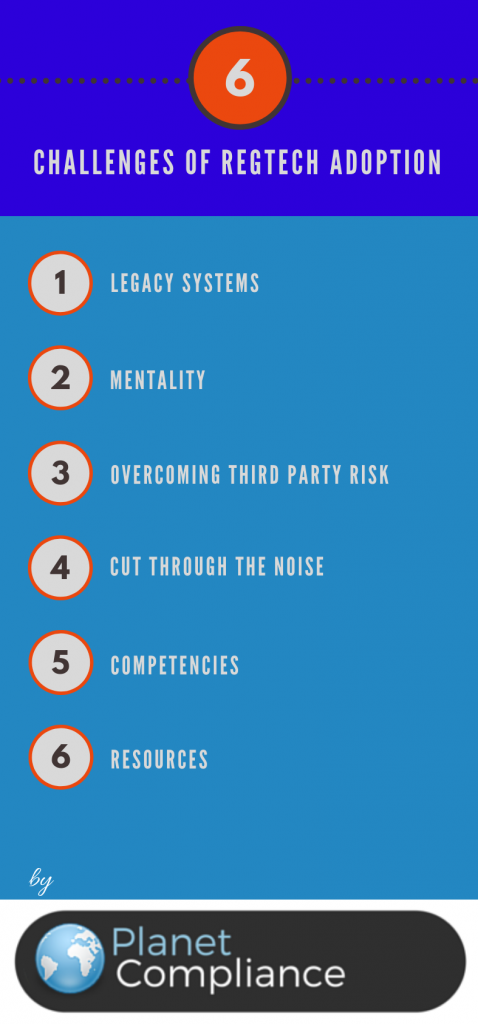The six challenges
A few weeks ago we published a post about the obstacles that RegTech needs to overcome to move to the next level. We focused on six challenges that we, from our experience, find are the key barriers to wider adoption and implementation of RegTech solutions:
Challenge No. 1: Legacy Systems
Challenge No. 2: Mentality
Challenge No. 3: Overcoming third party risk
Challenge No. 4: Cut through the Noise
Challenge No. 5: Competencies
Challenge No. 6: Resources
What the RegTechs say
However, despite frequently speaking to RegTechs, financial institutions and regulators, this is our view and we thought it might be a good idea to reach out to the RegTech firms directly, ask them about their experience and share with us what they see as the biggest challenges for RegTechs – with some very interesting replies:
Mentality is one of the core challenges that we identified and it is exactly what Kompli highlighted:
One of the biggest challenges is overcoming the fixed mindset of banks’ middle management. They're resistant to change, fail to grasp tech such as ours will enhance their ability to combat money laundering, avoid regulatory sanction & provide more job interest & greater skills.
— kompli-global (@kompliglobal) September 17, 2018
A common problem for RegTechs and in particular smaller organisations is that financial institutions and their service providers operate across jurisdictions as Justin Newton, the CEO of Netki points out:
“One of the biggest challenges is the global nature of the business where you have to take into account the jurisdictional rules of both the service provider, as well as each of their customers or investors.”
Fonetic emphasised that financial institutions sometimes struggle to fully grasp to scope of their regulatory obligations:
@PlanetComplianc , our biggest challenge is FIs thinking that #voice sampling is enough to improve #compliance. The @FCA and @CFTC would surely disagree. We offer the best #voicesurveillance for the #tradingfloor.
— Fonetic (@fonetic) September 24, 2018
Enforcd provided a “short” summary that touches on the difficulty to get to the right people:
“Here is the short summary: Enforcd has been fortunate in that we have not encountered too many barriers to adoption of our tech; the main reason for this is two fold – firstly we are SaaS and secondly we use no customer data, so are low risk from this perspective. Where we have suffered is in getting the attention of the right people – because compliance and risk staff (our primary sponsors) often say they are simply ‘too busy’ to consider new solutions. This is frustrating, as the whole point of Enforcd is to save money and time! It’s an understandable lament however – given the current regulatory environment and ever increasing Brexit uncertainty. We have noticed some characteristics that are shared by the firms and organisations we have worked with most successfully, namely: a dedicated innovation and/or regtech scout, who has budget and a mandate to go into the market and find effective solutions for company problems. These people can act as ‘intrapreneurs’ and hold the hands of more risk averse staff in firms, who are wary of sticking their neck out to work with a new, small vendor. The scouting team, who quite often have a tech background so are in a strong position to assess the viability of a platform or a solution, are well placed to advocate for start-up and scale-up vendors, and to run small scale, low risk pilots to create a strong business case, which can then be used to support wider engagement. It’s a model that works well for both sides. senior managers who are serious about finding good new solutions and are not afraid to suggest their teams take a look at these things. It’s amazing how quickly a deal can proceed when someone of sufficient seniority gets behind the concept. All in all though, in London especially, we have found we are pushing at an open door with Enforcd. The financial services industry is increasingly receptive to new solutions.”
Compliance often still is secondary to other aspects even though thanks to RegTech it is more than adhering to rules and creates opportunities, but that is still not the common perception as Seqvoia explains:
Why is #RegTech adoption slow ? We find that fund documentation is a #regulatoryobligation but not at the heart of the core business of #AssetManagement – hence the focus is more on delivering return than embracing #technology for #compliance
In our original post, we pointed out how difficult it is to cut through the noise. Something FixNix agrees with:
Discovery of the solutions & awareness of new business models popping . Even great #SaaS #GRC like us yet to be discovered by the large parts of the #compliance industry. We are pioneering #SaaS & there are many more doing diff other delivery models who need to be showcased well
— FixNix Inc., (@fixrnix) September 15, 2018
The implementation itself and the road to get there is the main obstacle for Impero:
“In our opinion, one of the key challenges in getting started with RegTech is the (un)ease of implementation! A lot of our customers were truly concerned about ‘how difficult is it?’. Everyone agrees that technology can make your life easier, but what does it take to get there – and, the insecurity of “will we be overtaken by even smarter solutions, already when we are in the process of implementing the one we just acquired.”.”
The bottom line
While overcoming the above challenges and the barriers we described in our original post are no small task, the story of these seven RegTech firms and others in the industry is evidence that we are on the right way to create a better financial industry for all of us.
If you have any question or would like to share your thoughts on the subject with us, join the conversation on Twitter and drop us a line at @PlanetComplianc

